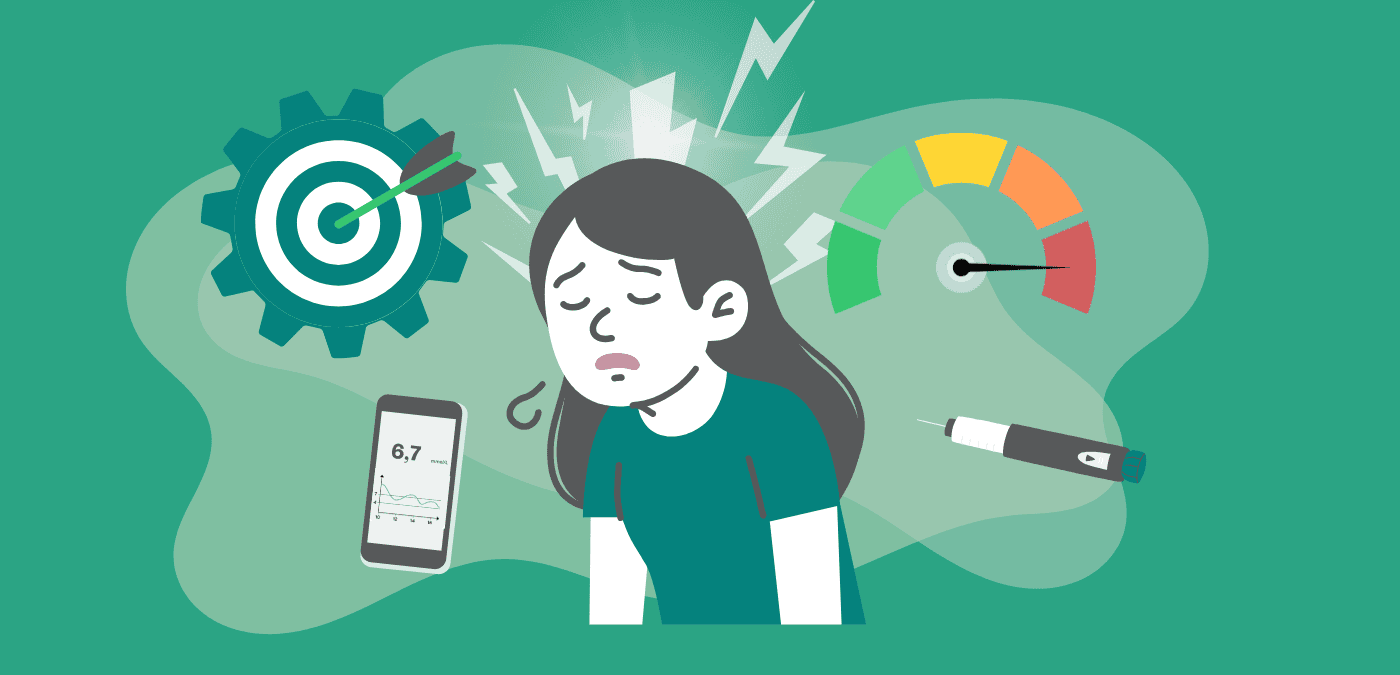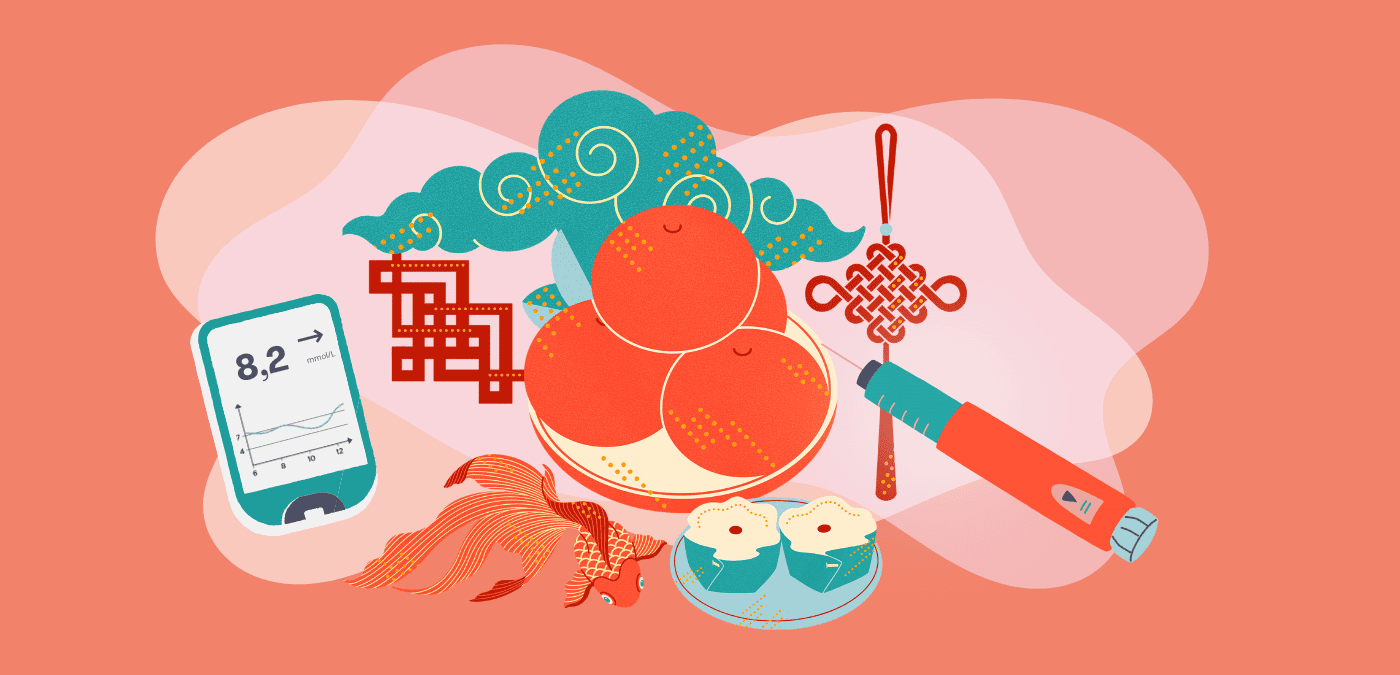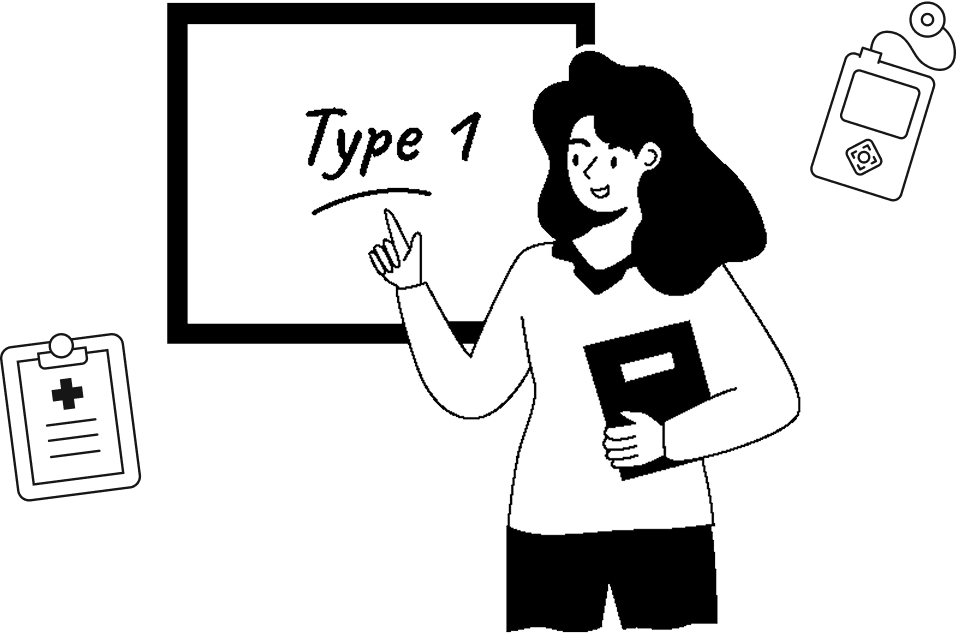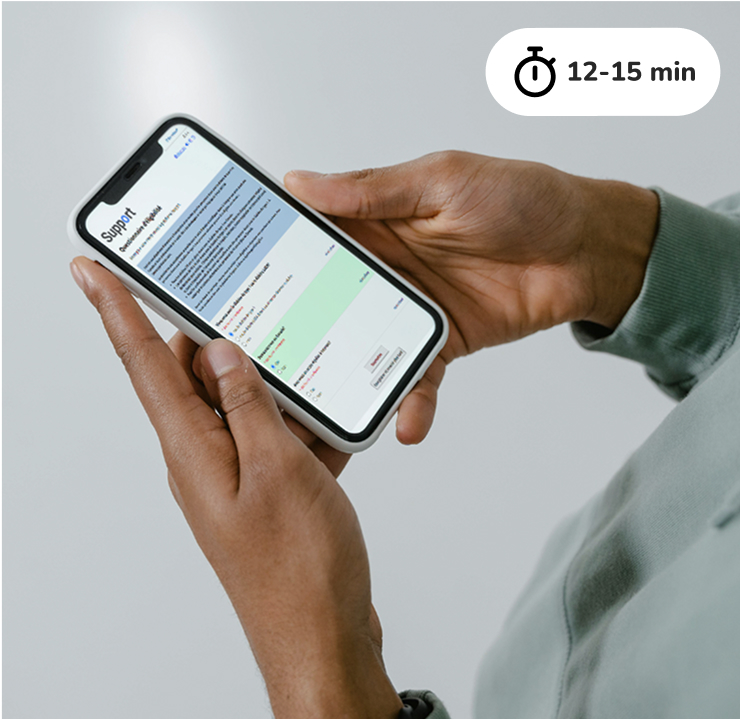Living with type 1 diabetes (T1D) is a full-time job. Constantly having to monitor your blood sugar, diet, physical activity or insulin can quickly become exhausting. Add perfectionism to the mix, and you’re in for a daily T1D management overload.
Numbered values such as blood sugar levels, time in range or HbA1c levels (glycated hemoglobin) give vital information for managing diabetes and assessing how our actions impact it. Twenty years ago, a large study involving people with T1D, called the Diabetes Control and Complications Trial (DCCT), showed that maintaining blood sugar levels close to target values significantly reduced the risk of complications affecting the eyes, the kidneys, the nerves and the heart. These results raised hopes for a healthy future for people with T1D, albeit not necessarily a more serene one.
As treatments and technologies evolved, so did the amount of data we have access to, which is now larger than ever. While graphs, alarms and trend arrows facilitate monitoring, they also require processing a lot of information and constant decision-making. For some, doing this on the daily eventually becomes exhausting and leads to hypervigilance.
Not to mention, even with these tools, the unpredictable remains part of the picture: sensor failure, catheter occlusions, hormones, stress, illness, emotions, outside temperatures are all factors that affect blood sugar levels and over which we have little to no control. It’s easy to fall in the trap and to try and control or anticipate everything.
What is perfectionism?
Perfectionism is not only about wanting to be the best; it’s mostly about believing that by doing everything perfectly, guilt, judgment and shame can be avoided.
Perfectionists often set very high and rigid standards for themselves. This often comes with an “all or nothing” mindset. If it’s not perfect, it’s a failure; there’s no in-between. Smaller victories can feel insufficient, and every mistake can give way to frustration, disheartenment and harsh self-blaming.
Perfectionism doesn’t only affect self-expectations, but also expectations towards others (e.g., family, friends, healthcare team, society as a whole) and what we believe others (e.g., loved ones, society) expect of us. A perfectionist might feel like it’s never enough, and like they’re not allowed to make mistakes or feel tired.
Perfectionism and diabetes: a dreaded duo
In the context of T1D, perfectionism suggests that to be responsible and avoid complications, one must be “perfect”. So, any value outside of the target range is seen as a personal failure and brings about frustration, guilt and distress.
Perfectionism manifests as either one of the two following forms, which are, in reality, two sides of the same coin:
- Hypercontrol – Each aspect of diabetes management is seen as a constant test and, as such, leads to overmonitoring blood sugar levels, rigorous carb counting, excessive restrictions or control of physical activity due to its impact on blood sugar and frequent corrections (insulin micro boluses or small snacks) to control any fluctuation. Such hypervigilance triggers a state of alertness and anticipation towards any potential risk. Over time, some will opt out of social activities such as outings, meals with friends or excursions in order to avoid losing “control” over their diabetes management, which reinforces isolation and complicates relationships.
- Avoidance – On the opposite side, some will turn to avoidance, often following a period of intense efforts to meet overly strict requirements that are impossible to maintain in the long term. They feel like they’re doing everything wrong or that they’re not good enough, and this leads to distress and discouragement. To relieve the pressure, they delay or omit tasks associated with diabetes management—checking blood sugar, insulin boluses or injections, counting carbs, following recommendations—whether entirely or partially. To avoid judgment, they push back medical appointments, and questions from family and friends feel intrusive. Such behaviours, often filled with guilt, generate frustration, pain and a feeling of loneliness, and reinforce anxiety and helplessness, which can isolate a person and trap them into a vicious circle.
In either case, perfectionism complicates the daily management of diabetes and increases the emotional load as well as the risk of burnout or chronic stress. Mental health conditions such as anxiety, decreased self-esteem and eating disorders.
Some studies have concluded that the hypercontrol type of perfectionism could be associated with an increased risk of hypoglycemia unawareness (i.e., not feeling the symptoms of low blood sugar) due to measures taken to avoid hyperglycemia (e.g., frequently inject correction boluses), which increase the risk of hypoglycemia. Accordingly, the avoidance type of perfectionism likely increases the risk of severe hyperglycemia or ketoacidosis.
How to manage T1D and shake off perfectionism
Here are a few real-life strategies you can adopt to avoid the cognitive and emotional overload that comes with perfectionism in the day-to-day management of diabetes.
- Show self-compassion – Some days are more difficult, and that’s normal. Acknowledging the effort you put in, regardless of results, will help reduce stress and emotional fatigue. Sometimes, just getting through the day is a victory. Managing diabetes is like running a marathon or, at times, an obstacle course: it requires adaptability and patience. And, it’s entirely valid to have other priorities than your blood sugar. A strict discipline is comforting to some, and not optimal for others. Wanting to do your best and making peace with mistakes and unexpected turns of events is all that matters : living with T1D requires a whole lot of humility.
- Know what data does and doesn’t do – Data such as blood sugar or glycated hemoglobin levels or time in range help to guide decisions, but they don’t reflect personal value, and they’re not exam marks. Just like a fuel gauge, they only indicate a status at a specific point in time.
- Seek progress, not perfection – Realistic and gradual adjustments that are easy to integrate to daily life are the way to go. Every small step counts. Good diabetes management is not in itself an end goal; rather, it’s a way to live life fully, to carry on projects, to uphold your values and to be there for those you love. When you feel discouraged, punishing or depreciating yourself will only feed into the feeling of failure. Be kind to yourself; it will help you regain motivation and confidence.
- Share how you feel – Sharing how you feel with a health professional, a friend or other people with T1D can help break the isolation and feel understood. Humour is also a good way to take a step back and relieve pressure. If the feelings of sadness, emotional fatigue and discouragement are persistent, it’s important to talk about it with a health professional.
- Learn about relaxation and mindfulness techniques – Taking some time for meditation, deep breathing, yoga and mindful walking can help reduce stress associated with the need to control everything by reconnecting you with your body and sensations away from judgment.
- Remember that T1D is only part of your identity – T1D in no way defines a whole person. Finding a hobby or a social activity or taking some rest can bring you pleasure and relaxation, as well as a feeling of accomplishment that is not tied to T1D. Anything that feeds curiosity, creativity or human relations can help you feel fulfilled and accomplished, regardless of how you manage your diabetes. Taking care of yourself is making room for what brings you joy and purpose, and stopping diabetes from taking all the space.
- Seek out connection and support from peers – When individual efforts don’t yield the desired outcome, one can feel isolated and misunderstood. Interacting with other people who live with T1D can help you relate, discover new strategies and feel supported in dealing with daily challenges. Support groups, associations and online communities offer a space for listening, sharing and showing solidarity. Coming to know about other experiences helps to relativize, to regain confidence and to feel a sense of belonging to a community who understands what you’re going through.
| Health professionals and perfectionism: To support and reassure |
|---|
| Health professionals play a crucial role in supporting people with T1D. However, even with the best of intentions, the manner in which diabetes management goals, results and associated risks can contribute to, and even aggravate the pressure and the feeling that one needs to be perfect. Managing T1D goes beyond achieving HbA1c under 7%, time in range results over 70% or time spent in hypoglycemia under 4%—all without severe hypoglycemia or ketoacidosis. While these indicators are indeed important, they don’t reflect the patient’s whole physical or mental health, well-being or quality of life. Mental health, emotional fatigue or T1D-related stress are often underestimated, but they do directly affect daily life. A patient that receives commands or “coldly” medical feedback will not feel supported; they will more likely feel fear and guilt, and strive for perfection to avoid deceit or failure. Saying “Your diabetes is not well managed” is not helpful. Offering support to reach a meaningful goal at a realistic pace is what really matters. To offer efficient support, it might be necessary to revisit the meaning of the therapeutic relationship, that is, supporting without judging, cheering on, validating efforts made and respecting the patient’s pace. Setting realistic goals, validating progress and flagging overly perfectionist behaviours are good buffers against burnout. It is also important to distinguish between what’s needed for optimal management and overload, and to discuss individualized priorities and goals rather than impose strict standards. If you live with T1D and you’re not satisfied with the relationship with your healthcare team, don’t hesitate to speak up. Share your dissatisfaction respectfully; it will give the relationship a chance to start afresh on a better foundation and clear up any misunderstandings. In some cases, it might be necessary to look for another professional who is better suited to your needs and style. The gap between feeling pressure and feeling truly supported can be filled with the right support. Getting the right support from a health professional means that they listen to your needs and your concerns and take them into account, clearly explain your options and results, give you advice according to your own pace and goals and, especially, acknowledge your efforts and motivation. |
In short, perfectionism and T1D often go hand in hand, and it’s understandable. However, they do nothing for your well-being. You can live more serenely with diabetes by learning to let go, to accept imperfections and to use adapted strategies.
__________________
To find out more
People with T1D and health professionals have access to Support’s reliable resources to help with daily management of diabetes, including mental health topics. You will find answers to your questions, and a discussion forum for people with type 1 diabetes.
Create your account now to have access to practical tips and support tools and learn at your own pace. Read up on mental load, burnout and type 1 diabetes-related distress and find tips on how to better manage CGM alarm fatigue.
Aware of the value of every experience, the BETTER registry collects testimonies from people living with type 1 diabetes in Canada, as well as from parents of affected children. By registering and sharing your story, you will help advance research and will also gain access to webinars on various aspects of type 1 diabetes.
References
- Skelley, Alexis & Spjut, Kersti. The Dangers of Perfectionism in Diabetes. YouTube, 2025. https://www.youtube.com/watch?v=nhvY9dSMSVs
- Ruiz-Aranda, Desireé, et al. “Sociocultural Attitudes Toward Appearance and Attitudes Toward Eating in Adolescents With Type 1 Diabetes: The Importance of Perfectionism.” Pediatric Diabetes, vol. 2025, article 9993342, 31 Jan. 2025. doi:10.1155/pedi/9993342
- Naito, Anna, et al. “Personality Traits of Alexithymia and Perfectionism in Impaired Awareness of Hypoglycemia in Adults With Type 1 Diabetes – An Exploratory Study.” Journal of Psychosomatic Research, vol. 150, 2021, p. 110634. doi:10.1016/j.jpsychores.2021.110634
- Beyond Type 1. The Danger of Perfectionism in Diabetes Management. 2025.
- Brown, A. (2017). Bright Spots & Landmines: The Diabetes Guide I Wish Someone Had Handed Me. The diaTribe Foundation. https://diatribe.org/bright-spots-and-landmines/
Written by: Sarah Haag, Clinical Nurse, B.Sc.
Reviewed by:
- Rémi Rabasa-Lhoret, MD, Ph.D.
- Anne-Sophie Brazeau, P.Dt., Ph.D.
- Amélie Roy-Fleming, RD, CDE, M.Sc.
- Jacques Pelletier, Claude Laforest, Michel Dostie, Amélie Eloundou, Jade Maria Moisan, Aude Bandini, patient partners of the BETTER project.





